Home
Food Quality and Safety Division
Food Quality and Safety Division
Background
The Food Quality and Safety Division (FQSD) is responsible for ensuring that all food available in the country is safe, hygienic, and of high quality, in compliance with national standards and regulations. The division is responsible for implementing the Food Act of Bhutan 2005 and its Rules and Regulations 2017. The division plays a crucial role in monitoring and enforcing food safety standards through regular inspection, testing and certification of both imported and domestically produced food products. FQSD also oversees risk assessment and management, ensuring that potential threats to food safety are identified and mitigated in a timely manner.
Additionally, FQSD works closely with stakeholders across the food supply chain, from producers to consumers, to promote good hygienic practices, food safety awareness and capacity building. It also facilitates development and revision of food safety guidelines, standards and procedures to align with international best practices such as those of Codex Alimentarius. Through its efforts, the Food Quality and Safety Division contributes to protection of public health and enhancement of consumer confidence in the national food system.
Who is Who
| Name | Designation | Email ID |
|---|---|---|
| Dechen Wangmo | Chief Regulatory and Quarantine Officer | dechenwangmo@bfda.gov.bt |
| Jambay Dorji | Dy. Chief Regulatory and Quarantine Officer | jambaydorji@bfda.gov.bt |
| Sonam Choden | Regulatory and Quarantine Officer | sonamc@bfda.gov.bt |
| Dechen Seldon | Regulatory and Quarantine Officer | dselden@bfda.gov.bt |
